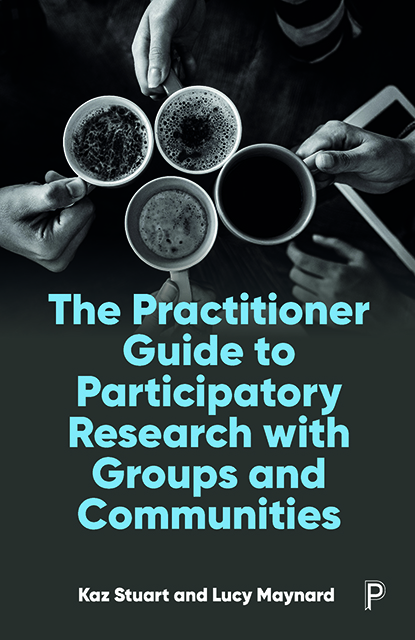Book contents
- Frontmatter
- Contents
- List of Figures and Tables
- Glossary
- About the Authors
- Acknowledgements
- Foreword
- Foreword
- Introduction
- 1 Just What is Participatory Research?
- 2 How do We Begin to Plan Our Participatory Research Project?
- 3 What Do We Want to Explore and Why?
- 4 What Ideas are the Foundations of Our Research?
- 5 How Will We go About Exploring Our Questions?
- 6 Who Can Get Involved to Explore Our Questions?
- 7 How Shall We Collect Our Data?
- 8 What Do We Do With Our Data?
- 9 How Do We Get Our Messages Out There?
- 10 How Do We Keep Everyone Safe?
- 11 Doing and Reviewing Participatory Research
- Conclusion
- References
- Index
Conclusion
Published online by Cambridge University Press: 21 June 2023
- Frontmatter
- Contents
- List of Figures and Tables
- Glossary
- About the Authors
- Acknowledgements
- Foreword
- Foreword
- Introduction
- 1 Just What is Participatory Research?
- 2 How do We Begin to Plan Our Participatory Research Project?
- 3 What Do We Want to Explore and Why?
- 4 What Ideas are the Foundations of Our Research?
- 5 How Will We go About Exploring Our Questions?
- 6 Who Can Get Involved to Explore Our Questions?
- 7 How Shall We Collect Our Data?
- 8 What Do We Do With Our Data?
- 9 How Do We Get Our Messages Out There?
- 10 How Do We Keep Everyone Safe?
- 11 Doing and Reviewing Participatory Research
- Conclusion
- References
- Index
Summary
Chapter overview
This concluding chapter revisits the key characteristics of participatory research and links them with wellbeing and social justice in order to give you a framework within which to create positive social change with communities.
Revisiting the principles of participatory research
Participatory research is grounded in assumptions that are radically different to many other forms of research. This is one reason why it happens relatively rarely. It is also comparatively lengthy to undertake, complex and resource intensive. However, it is also highly rewarding and worthwhile – for us, this far outweighs the challenges.
Let’s revisit some of the central assumptions behind participatory research in Table C.1 to remind ourselves of why it is such a powerful form of research. These are very stark examples to exemplify the point rather than to critique other forms of research which are all valuable in their own right, but different to participatory research.
These principles mean that a participatory research project is about far more than finding something out. It is committing to a community-led inquiry; it is about learning with people and about people; it is a complex process of change and development. It is fundamentally about making the world a better place. We hope you think those are worthy goals and that this book has given you the inspiration to give it a go.
Participatory research, wellbeing and social justice
We (Kaz and Lucy) have a longstanding commitment to wellbeing development. By this we mean feeling good and functioning well (Aked et al., 2008). We are deeply committed to supporting people’s wellbeing. We know we cannot do wellbeing to people; we can only provide the conditions in which they can work towards their own wellbeing. This is limited by social justice and the contexts in which they live. These contexts are not equal or equitable, many people are born into less favourable contexts than others and this can shape their lifelong opportunities for wellbeing. For us, wellbeing and context (and therefore, social justice) interact with one another.
- Type
- Chapter
- Information
- Publisher: Bristol University PressPrint publication year: 2022



